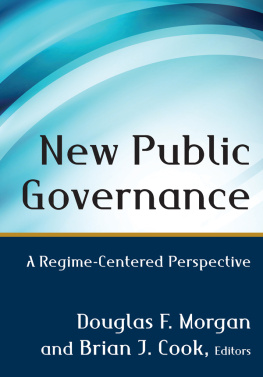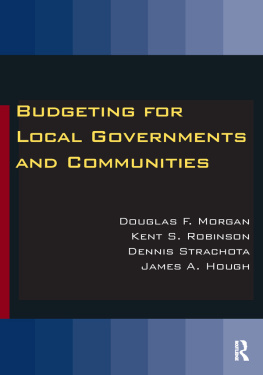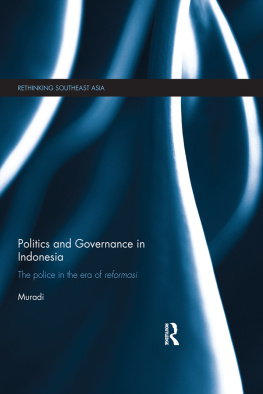New Public
Governance
New Public
Governance
A Regime-Centered Perspective
Douglas F. Morgan
and Brian J. Cook, Editors
First published 2014 by M.E. Sharpe
Published 2015 by Routledge
2 Park Square, Milton Park, Abingdon, Oxon OX14 4RN
711 Third Avenue, New York, NY 10017, USA
Routledge is an imprint of the Taylor & Francis Group, an informa business
Copyright 2014 Taylor & Francis. All rights reserved.
No part of this book may be reprinted or reproduced or utilised in any form or by any electronic, mechanical, or other means, now known or hereafter invented, including photocopying and recording, or in any information storage or retrieval system, without permission in writing from the publishers.
Notices
No responsibility is assumed by the publisher for any injury and/or damage to persons or property as a matter of products liability, negligence or otherwise, or from any use of operation of any methods, products, instructions or ideas contained in the material herein.
Practitioners and researchers must always rely on their own experience and knowledge in evaluating and using any information, methods, compounds, or experiments described herein. In using such information or methods they should be mindful of their own safety and the safety of others, including parties for whom they have a professional responsibility.
Product or corporate names may be trademarks or registered trademarks, and are used only for identification and explanation without intent to infringe.
Library of Congress Cataloging-in-Publication Data
New public governance: a regime-centered perspective / edited by Douglas F. Morgan and Brian J. Cook.
pages cm
Includes bibliographical references and index.
ISBN 978-0-7656-4099-4 (hardcover : alk. paper)ISBN 978-0-7656-4100-7 (pbk.: alk. paper)
1. Public administration. 2. Local government. 3. Leadership. I. Morgan, Douglas F., 1943-, author, editor of compilation. II. Cook, Brian J., 1954-, author, editor of compilation.
JF1351.N464 2014
351dc23
2013047526
ISBN 13: 9780765641007 (pbk)
ISBN 13: 9780765640994 (hbk)
CONTENTS
Douglas F. Morgan and Craig W. Shinn
Stephanie P. Newbold
Richard T. Green
Douglas F. Morgan, Gary L. Larsen, Guoxian Bao, and Xuejun Wang
Donald P. Moynihan
Michael W. Spicer
Vera Vogelsang-Coombs
Margaret Banyan
Claudia Mara Vargas
Gary L. Larsen
Don Bohn
Kent S. Robinson and Douglas F. Morgan
Debra Whitall, Craig Thomas, Steve Brink, and Gina Bartlett
Shpresa Halimi and Craig W. Shinn
Brian J. Cook
Phillip J. Cooper
Eric T. (Rick) Mogren
Kristen Magis, Marcus Ingle, and Ngo Huy Duc
Scott Lazenby
Douglas F. Morgan
Stephanie P. Newbold and David H. Rosenbloom
Kevin Kecskes, Masami Nishishiba, and Douglas F. Morgan
Douglas F. Morgan, Craig W. Shinn, and Brian J. Cook
This collection of chapters on new public governance (NPG) is the outgrowth of information presented at a Portland State University symposium titled Public Service Leadership in a Globalized World, sponsored by the Hatfield School of Governments Center for Public Service in September 2011. The Center seeks to improve public service by bringing practitioners and academics together to coproduce applied research, develop and test new theories, and participate in leadership development programs. More than half of the articles in this volume are the product of work undertaken with or through the Center for Public Service.
Over the past several decades, the Center has engaged in a variety of projects that would be characterized as NPG in nature, among them applied research on conciliatory practices, technical assistance in civic capacity building and citizen engagement, and the design of new curriculum to better prepare leaders to operate successfully across organizational, jurisdictional, and intersectoral boundaries. At the core of this work is a belief that, while important, the new public management (NPM) mantragovernment should be run like a businessis not sufficient in dealing with value-centered conflicts, the allocation of scarce public resources, and the protection of common pool goods. Furthermore, NPM provides an inadequate basis for leadership in settings where there is extensive uncertainty.
An important goal of the symposium was to share the lessons that scholars and practitioners have learned from their experience in studying and practicing NPG in comparative settings, whether it be on the national or international front. These perspectives are important for better understanding what differentiates NPG from NPMthe values, institutions, and governing structures and processes that produce public outcomes, build trust, and contribute to the legitimacy of political systems.
FOCUS OF THE BOOK
Books and articles written to date on NPG fall into two categories: The first is quite critical of the movement (see Smith and Lipsky 1993; Moe and Gilmour 1995; Smith and Smyth 1996) or skeptical that there is really anything all that new about NPG (Lynn 2001). The other emphasizes the importance of providing public servants with the knowledge and skills they need to perform successfully within horizontal structures of authority, in addition to the traditional hierarchical systems with which they are more familiar (Crosby and Bryson 2005; Brooks and Grint 2010). Stephen Osbornes (2010) collection of essays provides the most complete overview of the range of issues and opinions regarding the significance of NPG.
This volume focuses on issues far different from those commonly found in the current body of scholarship on new public governance. Each chapter examines a specific aspect of the following question: What can we do to ensure that the structures and processes of authority in networked governance systems are firmly tethered to the underlying core values and legal principles of the political system? While the articles arise out of the American experience, several of them draw from international research on networked governance. Many of the authors have been working on network governance challenges with partners in other countries. As a result, there is a concerted effort by the authors of the collected contributors to generalize about the lessons learned from networked governance leadership and scholarship for all political systems.
The authors of this book include scholars who have been at the forefront of the NPG debate, as well as scholar-practitioners who have spent much of their public service careers operating within both vertical and horizontal structures of authority. Their stories shed light on how networked, contract-based, and partnership-centered approaches to government can be undertaken in ways that preserve the central values of the American constitutional and political system.
Overall, this book argues that NPG requires public administrators to be increasingly self-conscious about two key issues: (1) the constitutional and political ideals that provide the framework for their service, and (2) the institutional foundations that sustain their work with nonprofit and private-sector partners through time. As the chapters show, these factors have important implications for how scholars and practitioners think about those values and institutional foundations and the leadership principles that flow from them, as well has how to educate and train public servants, especially at the subnational and local levels of government, where the reality of NPG is most dramatically brought to life and tested.














